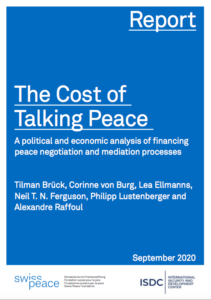Funding aspects are a key issue in peace negotiation and mediation processes (referred to as peace negotiations in shorthand). Yet, their role and implications are insuf ciently understood. Funding for peace negotiations is often treated as a purely technical issue. However, on closer inspection, funding is fundamentally political and, as such, has a profound impact on the architecture and the dynamics of peace negotiations.
For a functioning peace negotiation process, the funding requests of the negotiation stakeholders, de ned as the negotiating parties and the mediator, need to be matched with a limited pool of external funds made available by donors. This research conceptualizes this resource allocation dynamic as a matching game that consists of a series of interactions (or negotiations) with the intention of matching the existing funding requests with available external funds. The negotiation architecture that is nally applied in a given process thus results, at least to some extent, from a negotiation between the participating negotiation stakeholders and the donors.
When it comes to the overall funding market for peace negotiations, the research team found several features that define it: a) funding is endogenous to the overall negotiation architecture, b) the market became more voluminous and diversified over the years, and c) funding is increasingly “projectized” (made up of project-based funding) and professionalized.
The nancing of peace negotiations is beset by a series of market fail- ures that can undermine entire processes. While few, if any, processes have failed due to market failures, these constitute obstacles to well-functioning negotiations, contribute to increased duration of the processes, and increase their costs. To overcome the existing market failures, actors have to deal more adequately with information asymmetries and misaligned incentives, as well as with collective action problems.
The research team found eight funding-related issues that underpin the market and can in uence the ef cient functioning of peace negotiations in a positive or negative way. These key issues are:
- Distribution: While some negotiation processes – as well as specific phases or components of these processes – are overfunded, others do not receive enough support.
- Responsiveness: Funds are often needed more rapidly than donors can move.
- Competition and coordination: Donors’ failure to coordinate with each other can lead to duplication of efforts and missed opportunities to make use of comparative advantages.
- Donor leverage: Donors, at times, use funding to influence the process, for better or worse.
- Legal, institutional and administrative constraints: Donors are bound by various constraints, which sometimes are not mutually compatible with the necessities of the negotiation process.
- Legitimacy of the funding: If donors (and funds) are not perceived as impartial, the funding mechanism itself, and therefore the whole negotiation process, can be undermined.
- Financial incentives: Financial incentives, such as per diems, can play an enabling or disabling role for the conduct of peace negotiations, depending on their design and application.
- Trust: Funding can have an important role in building trust between nego- tiating parties, which can underpin or undermine faith in the entire process.
To overcome funding challenges, the research came up with several strategies for negotiation stakeholders and donors:
- Establishing suitable communication and coordination mechanisms
- Diversifying funding sources
- Ensuring a clear division of roles
- Planning ahead
- Designing tailor-made funding modalities
- Using dedicated administrative capacities
- Setting the incentives right
- Establishing adequate funding instruments and strategic partnerships
Publication Details
- Year of Publication: 2020
- Region/s: Global
- Theme/s: Violence & Peacebuilding
- Research Topic/s: Peacebuilding & Reconstruction · Violence & Conflict



